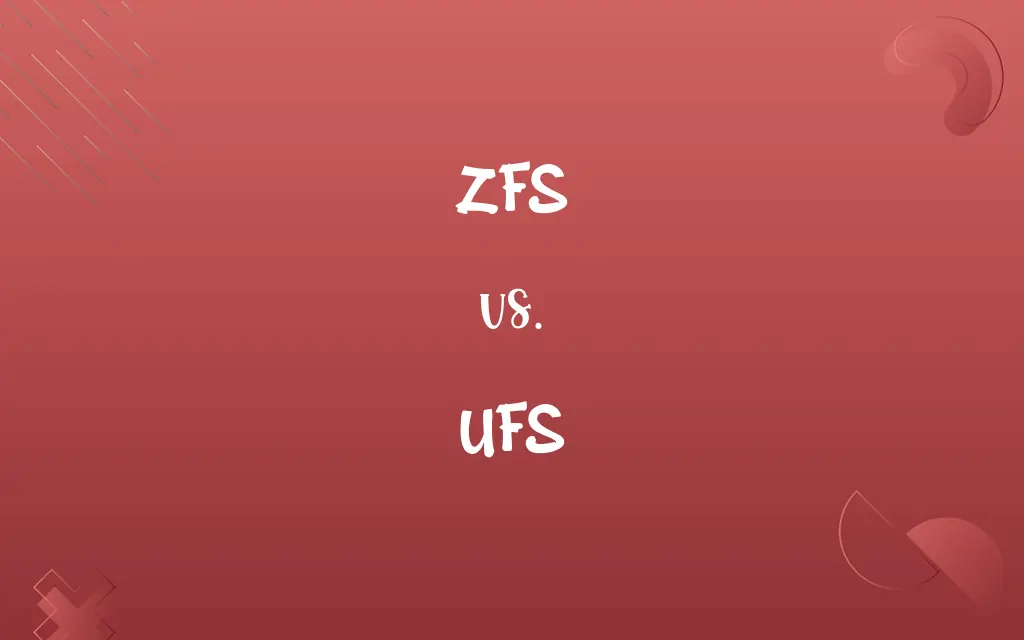ZFS vs. UFS: Know the Difference

By Shumaila Saeed || Published on February 10, 2024
ZFS is a modern, advanced file system with robust data integrity and volume management features, while UFS is a traditional Unix File System offering standard file system capabilities with less complexity.

Key Differences
ZFS (Zettabyte File System) is a modern file system and logical volume manager initially developed by Sun Microsystems. It is known for its high data integrity, supporting high storage capacities, and integrating file system and volume management. UFS (Unix File System), on the other hand, is older and was the default file system for many UNIX operating systems. It's simpler but lacks many of the advanced features found in ZFS.
Shumaila Saeed
Feb 10, 2024
ZFS offers advanced features like snapshot and clone capabilities, continuous integrity checking and automatic repair, and efficient data compression. These features ensure data integrity and efficient storage management. In contrast, UFS is more basic, lacking such advanced features, and primarily provides fundamental file storage with a focus on stability and reliability.
Shumaila Saeed
Feb 10, 2024
Data protection is a major strength of ZFS, which uses a model known as copy-on-write to prevent data corruption and includes built-in RAID support. UFS does not inherently have such robust data protection mechanisms, relying on traditional methods of file storage without the advanced data integrity checks of ZFS.
Shumaila Saeed
Feb 10, 2024
Performance-wise, ZFS is designed to work well with large datasets and is more efficient in handling large files and volumes. It's better suited for modern, large-scale storage requirements. UFS, while reliable, doesn’t scale as well for larger storage needs and is generally used in systems where the storage requirements are modest.
Shumaila Saeed
Feb 10, 2024
Lastly, ZFS is known for its scalability, capable of handling zettabytes of data. It's a forward-thinking file system, adaptable to future storage needs. UFS, with its simpler design, is not designed for such extreme scalability and suits environments where such massive data capacity is not a requirement.
Shumaila Saeed
Feb 10, 2024
ADVERTISEMENT
Comparison Chart
Data Integrity
High, with copy-on-write and checksums
Basic, without inherent advanced data integrity mechanisms
Shumaila Saeed
Feb 10, 2024
Storage Management
Volume management integrated, handles large volumes efficiently
Separate volume management, less efficient for large volumes
Shumaila Saeed
Feb 10, 2024
Scalability
Extremely scalable, designed for zettabytes of data
Less scalable, suitable for modest storage needs
Shumaila Saeed
Feb 10, 2024
Special Features
Snapshots, cloning, RAID-Z
Simplicity and reliability in traditional environments
Shumaila Saeed
Feb 10, 2024
ADVERTISEMENT
ZFS and UFS Definitions
ZFS
ZFS integrates file system and volume management, streamlining storage architecture.
We chose ZFS for its ability to efficiently manage both file systems and volumes.
Shumaila Saeed
Jan 20, 2024
UFS
UFS is a classic example of early file system design in computing history.
Studying UFS gives insight into the early development of file systems.
Shumaila Saeed
Jan 20, 2024
ZFS
ZFS offers high scalability, ideal for modern, large-capacity storage needs.
Our growing storage demands made ZFS an obvious choice.
Shumaila Saeed
Jan 20, 2024
UFS
UFS offers basic file system functionalities focused on stability and reliability.
Our decision to use UFS was based on its proven reliability.
Shumaila Saeed
Jan 20, 2024
ZFS
ZFS is an advanced file system with comprehensive data protection features.
The ZFS file system is used to prevent data loss in our data center.
Shumaila Saeed
Jan 20, 2024
ADVERTISEMENT
UFS
UFS operates with a simpler design, suitable for modest storage requirements.
For our small-scale storage needs, UFS is perfectly adequate.
Shumaila Saeed
Jan 20, 2024
ZFS
ZFS ensures data integrity through continuous integrity checking and automatic repair.
ZFS's integrity checking feature saved us from potential data corruption.
Shumaila Saeed
Jan 20, 2024
UFS
UFS lacks the advanced features of modern file systems like ZFS.
We didn't need the advanced features of ZFS, so we opted for UFS.
Shumaila Saeed
Jan 20, 2024
ZFS
ZFS is known for its efficient data compression and deduplication capabilities.
Using ZFS, we reduced our storage footprint significantly through data deduplication.
Shumaila Saeed
Jan 20, 2024
UFS
UFS is a traditional file system used in UNIX-based operating systems.
We use UFS for our legacy UNIX servers.
Shumaila Saeed
Jan 20, 2024
Repeatedly Asked Queries
What is ZFS?
ZFS is a modern file system with advanced data integrity and volume management features.
Shumaila Saeed
Feb 10, 2024
How does ZFS ensure data integrity?
ZFS uses copy-on-write and continuous integrity checking to prevent data corruption.
Shumaila Saeed
Feb 10, 2024
Is UFS suitable for large-scale storage?
UFS is less suitable for large-scale storage compared to ZFS due to its simpler design.
Shumaila Saeed
Feb 10, 2024
Does UFS have advanced features like ZFS?
No, UFS lacks the advanced features found in ZFS and focuses on basic file storage.
Shumaila Saeed
Feb 10, 2024
Is ZFS more scalable than UFS?
Yes, ZFS is highly scalable and can handle zettabytes of data, unlike UFS.
Shumaila Saeed
Feb 10, 2024
Can UFS be used in modern storage applications?
UFS can be used but may not be ideal for modern applications requiring high scalability and advanced features.
Shumaila Saeed
Feb 10, 2024
What is UFS?
UFS is a traditional Unix File System, known for its simplicity and stability.
Shumaila Saeed
Feb 10, 2024
How does ZFS handle data compression?
ZFS supports efficient data compression and deduplication.
Shumaila Saeed
Feb 10, 2024
Can ZFS handle large volumes efficiently?
Yes, ZFS is designed to efficiently manage large volumes and files.
Shumaila Saeed
Feb 10, 2024
What are the key features of ZFS?
Key features include data integrity, volume management, scalability, and RAID-Z support.
Shumaila Saeed
Feb 10, 2024
What makes UFS reliable?
UFS's simplicity and time-tested design contribute to its reliability.
Shumaila Saeed
Feb 10, 2024
Can UFS provide snapshots and clones like ZFS?
No, UFS does not offer snapshot and clone capabilities inherent to ZFS.
Shumaila Saeed
Feb 10, 2024
What is a major advantage of ZFS over UFS?
A major advantage of ZFS is its robust data protection and management features.
Shumaila Saeed
Feb 10, 2024
Is ZFS suitable for traditional UNIX systems?
While ZFS can be used in UNIX systems, it's more advanced than traditional UNIX file systems like UFS.
Shumaila Saeed
Feb 10, 2024
How does UFS compare to ZFS in terms of data integrity?
UFS has basic data integrity capabilities, while ZFS offers comprehensive data protection and integrity.
Shumaila Saeed
Feb 10, 2024
What is the future outlook for UFS compared to ZFS?
UFS remains relevant for specific use cases, but ZFS is more adaptable to future storage challenges and needs.
Shumaila Saeed
Feb 10, 2024
What type of file system is ZFS considered?
ZFS is considered a modern, advanced file system and volume manager.
Shumaila Saeed
Feb 10, 2024
Is ZFS more complex to manage than UFS?
ZFS can be more complex due to its advanced features, compared to the simpler UFS.
Shumaila Saeed
Feb 10, 2024
What environments are suitable for UFS?
UFS is suitable for environments with modest storage needs and a preference for traditional file system architecture.
Shumaila Saeed
Feb 10, 2024
Can ZFS be integrated with existing storage solutions?
Yes, ZFS can be integrated with various storage solutions, offering scalability and advanced management.
Shumaila Saeed
Feb 10, 2024
Share this page
Link for your blog / website
HTML
Link to share via messenger
About Author
Written by
Shumaila SaeedShumaila Saeed, an expert content creator with 6 years of experience, specializes in distilling complex topics into easily digestible comparisons, shining a light on the nuances that both inform and educate readers with clarity and accuracy.








































































